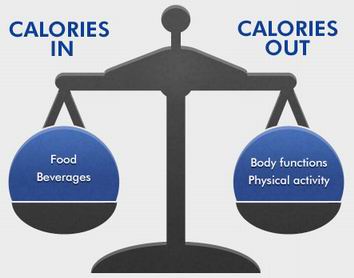About nutrition
Nutrition is the most important aspect of health in relation to weight manipulation. Unfortunately, it is also one of the most misunderstood and misconstrued components of living a healthy lifestyle. If you are committed to making a lifestyle change, exercise alone may not be enough. Taking control of your nutrition will greatly assist you in the pursuit of your goals. This information will not give you a day-by-day, meal-by-meal plan, it will however, help to educate and guide you towards a healthier lifestyle.
The basics
Food is energy, specifically measured in calories. Our bodies run on energy that is also expressed in calories. The most basic way to explain nutrition in relation to weight gain or loss is with the concept of Energy Balance.

Each day, our bodies need a certain amount of calories to maintain normal function. This is known as your basal metabolic rate or BMR. So, even if you sit in bed all day long, you need energy to survive. We also need energy to perform our daily activities, such as work and exercise. We will call your BMR + daily energy expended "Energy Out." Energy Out can be expressed in terms of calories as well.
On the other hand, "Energy In" is what we ingest throughout the day. This is where being educated and aware of what you are eating becomes important. Use nutrition labels to your advantage. Sometimes adjusting portions can be enough to warrant the weight loss/gain wanted. Also, keep in mind each gram of protein and carbohydrate has 4 calories and each gram of fat has 9. We are in control of our daily energy expended and energy consumed. By being conscious of how much energy we expend and consume, we can manipulate bodyweight.
If you think about your daily energy balance like a scale with "Energy In" on one side and "Energy out" on the other it becomes easier to manipulate weight. If you take in the amount of energy you expend consistently, your weight will remain about the same, the scale is balanced. If you consistently take in more energy than you expend, you will gain weight and vice versa. So, depending on your goals, you will either attempt to increase energy expended (exercise) and decrease calorie intake (eating) or increase calorie intake to outweigh your activity.
Weight loss
Healthy weight loss is considered between one-half and two pounds per week. Extremely fast weight loss is not healthy, is mostly water and is typically not sustainable. This is where patience and consistency will be important. It may take some time to find what number of calories and amount of exercise yields the weight loss desired.
To begin a weight loss program, again, I recommend 5-7 meals, including planned snacks. These meals should be a little less than half carbohydrate, a third protein, and a fifth fat. Finding foods that are healthy but that you enjoy is a huge part of success with weight loss. Choose foods that are lower calorie, but that you like! If you do not like it, you will not do it.
There are plenty of ways to reduce daily calorie intake. One is to switch from a soda, juice or milk to drinking water with meals. Another is to watch condiments; some may add a substantial amount of calories without much taste. Using spices and marinades rather than dressings or sauces will help to lower calorie intake. Most mustard is calorie free or has few calories. There are also sugar free alternatives such as Jello, maple syrup, and jam that can reduce calories. Paying attention to nutrition labels will greatly benefit you in controlling food intake. If there are snacks, foods or drinks that are adding calories that you are able to do without, substitute or remove them.
On the other side of things, eating too little on a regular basis may hinder weight loss. It is important to be getting in enough calories to keep your body running efficiently. Some people find it hard to lose weight because they are under consuming calories. They also may feel groggy, lethargic, or even sick. By eating enough calories to create a negative energy balance, but still falling within healthy ranges, you will have the greatest chance for long term success with your goals.
Preparation may be the best practice to aid in weight loss. Having food with you during the day, whether it is at work or when you’re traveling, will help you to stay on track. If you have your daily food ready, you will be more apt to stick to your diet than if you have cook everything each time you need to eat. If you know you will be gone all day, pack your meals in Tupperware the night before. Also, if you know you eat a lot of chicken, having a large container of pre-made chicken, or whatever the food may be, is a great idea.
Weight loss takes dedication, preparation, and consistency. It may be frustrating if you are not losing weight as fast as you would like, but remember, stay consistent and find what works for you. If you want lifelong changes, you need to find behaviors that you can sustain for life.